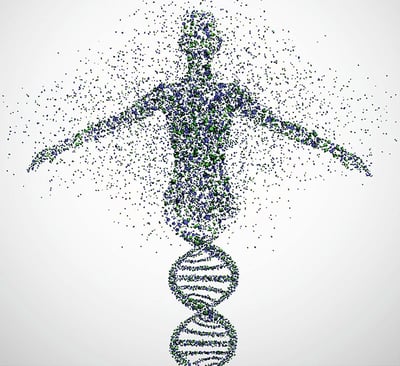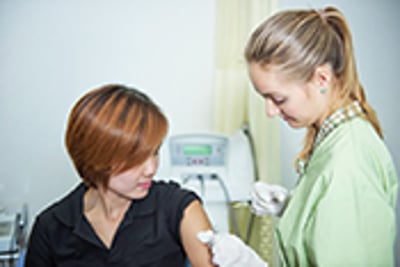FORCE's eXamining the Relevance of Articles for You (XRAY) program looks behind the headlines of cancer news to help you understand what the research means for you.
XRAY is a reliable source of hereditary cancer research-related news and information.
Learn more about the XRAY program
In portal: Breast Cancer, Categories Prevention
Article : Interview with Angelina Jolie's doctor promotes meatless diet and scientific inaccuracies
Most relevant for:
Dr. Kristi Funk, Angelina Jolie's Hollywood breast surgeon, is promoting her new book about breast cancer. This article from the UK newspaper The Times includes an interview with Funk about her book, which proposes that diet is responsible for breast cancer. This XRAYS addresses scientific inaccuracies in this article. (8/7/18)
Read More
Relevance: Medium


Strength of Science: Medium


Research Timeline: Human Research


Study : Evaluation of some direct-to-consumer genetic testing reveals inaccuracies and misinterpretations
Relevance: Medium


Strength of Science: Medium


Research Timeline: Human Research


Most relevant for: People who are considering or have had direct-to-consumer testing
A clinical genetic testing laboratory examined results from direct-to-consumer genetic testing ordered directly by patients. They found many instances of false positives—reported mutations that were not actually present—and in some cases, reports of variants that "increased risk," but were actually benign. This study emphasized the importance of involving genetics experts in the interpretation of genetic test results. (6/28/18)
Read More
Article : The right not to know when not knowing is dangerous
Most relevant for: People with Icelandic heritage
Healthcare providers are bound by the guiding principle of doing no harm. But how does this concept apply to their patients who have not consented to genetic testing or who do not want to know their results? In that case, is providing test results more harmful or not? Anna Clausen explores these issues in the context of breast cancer gene testing in her Global Health Now article “The Right Not to Know: When Ignorance is Bliss but Deadly.” (4/20/18)
Read More
Study : FDA updates report on risk of lymphoma from breast implants
Most relevant for: Women who currently have textured implants or expanders or who have had them in the past
Note: On 07/25/19, the FDA announced a recall of Allergan BIOCELL textured implants and expanders, due to their association with BIA-ALCL. On October 27, 2021 the FDA announced stronger guidance on breast implant safety.
In March 2017, the Food and Drug Administration reported that patients with breast implants may be at increased risk for a rare type of lymphoma. This was covered in a previous XRAYS review. The FDA has continued to collect data since the first reported association in 2011. Recently, the agency released an update on the number of reported cases of breast implant-associated lymphoma and lifetime risk estimates for women with textured breast implants. (04/02/18)
Read More
Relevance: Medium-High


Strength of Science: Medium


Study : Take your time, follow your heart: strategies for communication about family planning
Relevance: Medium-High


Strength of Science: Medium


Most relevant for: Young high risk women
When a woman is newly diagnosed with a BRCA mutation, she faces many risk management decisions. Although many of these decisions impact family planning, little guidance is available on how to communicate this information. This study examines female previvors’ advice on effective strategies for discussing family planning decisions. (03/28/18)
Read More
Relevance: Medium-High


Strength of Science: Medium-High


Research Timeline: Post Approval


Study : What is the risk of breast cancer recurrence after nipple-sparing mastectomy?
Relevance: Medium-High


Strength of Science: Medium-High


Research Timeline: Post Approval


Most relevant for: Breast cancer patients who are considering or have had a nipple sparing mastectomy
Nipple-sparing mastectomy (NSM) offers better cosmetic results for women who have immediate breast reconstruction (at the same time as their mastectomy). Over the past decade, NSM has gained popularity among surgeons and patients. Studies show that women who keep their own nipples have higher rates of satisfaction and psychological well-being after mastectomy and reconstruction compared to women who lose their nipples. However, little data exists on the long-term risk of recurrence following NSM. New research adds to a growing body of evidence suggesting that risk of recurrence is low after NSM in carefully selected patients with breast cancer. (1/25/18)
Read More
Study : Alcohol and breast cancer risk in African American women
Most relevant for: African American women who would like to lower their breast cancer risk
The link between alcohol intake and breast cancer is well known, but most studies have involved only White women. Recently, a large study of more than 22,000 African American (AA) women found that similar to White women, increased alcohol consumption is associated with a greater risk of breast cancer. (10/27/17)
Read More
Article : Can lifestyle changes impact breast cancer risk?
Most relevant for: Any woman concerned about her risk for breast cancer
A recent New York Times article shared how “adopting protective living habits” could help keep breast cancer “at bay”. While many of these lifestyle changes and strategies like not smoking, avoiding weight gain, reducing alcohol consumption, eating a heart-healthy diet, and increasing physical activity have been shown to reduce breast cancer risk, there are other risk factors that one cannot control such as having a BRCA or other mutation that significantly increases breast cancer risk. Importantly, no one strategy has been proven to totally eliminate breast cancer risk. However many of these approaches have overall health benefits. (9/21/2017)
Read More
Relevance: Medium-High


Strength of Science: Medium


Research Timeline: Post Approval


Study : Does aspirin lower a woman’s breast cancer risk?
Relevance: Medium-High


Strength of Science: Medium


Research Timeline: Post Approval


Most relevant for: Women at average risk for breast cancer
Women who take aspirin regularly may have a reduced risk of breast cancer. However, previous studies have reported mixed results. Few of these studies have looked at whether this potential benefit of aspirin is linked to specific types of breast cancer. This study found a small reduction in breast cancer risk for women who took a low-dose aspirin at least three times per week, but only for one subtype of breast cancer. Women who took aspirin were less likely to develop ER/PR-positive, Her2- negative breast cancer, the most common type of breast cancer. This study found no breast cancer risk reduction for women who used regular-dose aspirin or other nonsteroidal anti-inflammatory drugs (NSAIDS). (8/29/17)
Read More
Relevance: Medium-Low


Strength of Science: Medium-Low


Research Timeline: Animal Studies


Article : Report on vaccines to prevent hereditary cancer
Relevance: Medium-Low


Strength of Science: Medium-Low


Research Timeline: Animal Studies


Most relevant for: High risk women who have not had breast cancer
On 05/30/2017, Good Morning America aired a segment entitled “Can a vaccine help prevent breast cancer at its earliest stages?” The story outlines the need for cancer prevention and hints at early research into a cancer vaccine. (8/1/17)
Read More